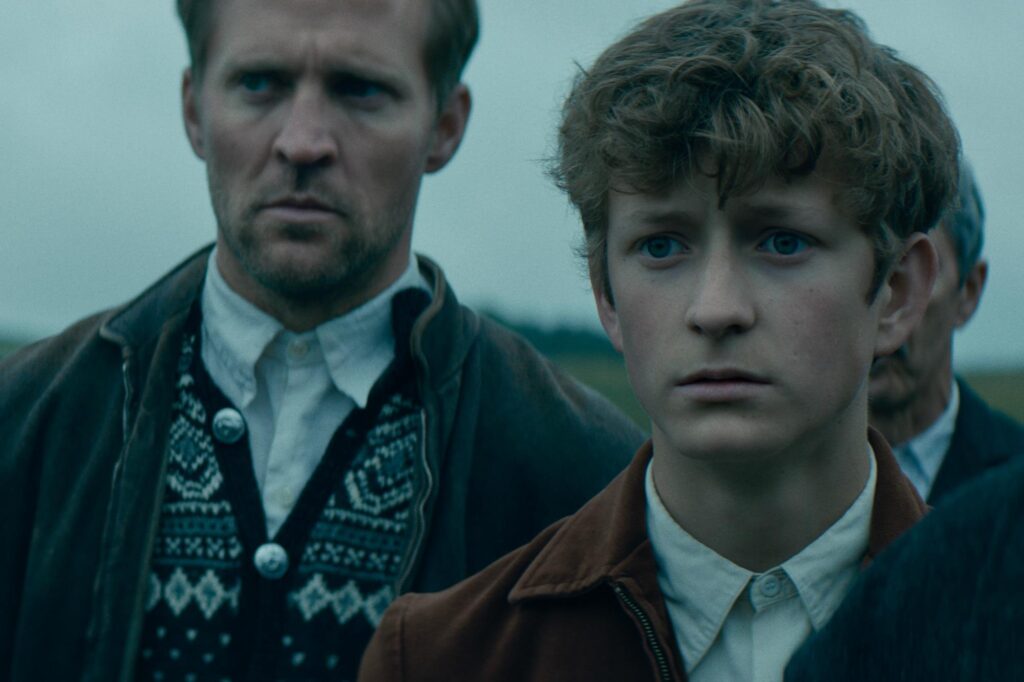Read also:
How to Watch FX Live Without CableHow To Watch AMC Without CableHow to Watch ABC Without CableHow to Watch Paramount Network Without CableHans Petter Moland’s adaptation of Per Petterson’s novel is a sensual look at growing up, but it’s more inert than introspective.
Despite what may seem to be the case at times, there’s a difference between being self-aware and being self-conscious. Not only is this apparent for people, though; it’s also apparent for art. It’s even more so the case for art about self-conscious people. Whether or not it knows it, Out Stealing Horses fits this bill to a tee. And no, it doesn’t seem to know it that well.
Symbolism abounds, but that isn’t the issue. It’s that it’s arch, becoming increasingly precocious throughout its runtime. Nettles sift between characters’ hands, snow weighs down trees, and freshly dead lumber lie in rivers and grassy knolls. The narrative jumps back and forth between 1999 and 1948, but for a movie so entrenched in thematic introspection, that should work. All of it is tenuous, all memories of memories. It’s a sensual experience stuck in the past, and the retrospection is too detached to fully feel anything it remembers. But it’s all too self-conscious here, and frankly, it’s boring.
Based on Per Petterson’s novel, Out Stealing Horses begins in November 1999. The elderly Trond (Stellan Skarsgård) is living in rural Norway. A recent widower fresh from his native Sweden, he’s now content to drink heavily and sleep even harder. One night, however, he comes across Lars (Bjørn Floberg), a neighbor who, against all odds, Trond recognizes as a childhood friend. With this, he recalls the summer of 1948 when he and those around him befell a series of hardships that dragged him out of innocence and into manhood. Sometimes it’s tactile, experiential. Sometimes it feels like a deodorant commercial.

The difference between the two may seem to be more cavernous. They aren’t as much as would one expect, however. A majority of Out Stealing Horses’ given moments are at the mercy of whatever sensual trickery commands the scene at hand. Kristoffer Endresen’s heightened sound design blurs the line between nature and sexuality, the former often masking the latter. DP Rasmus Videbæk, on the other hand, does about what can be expected given the settings on display here. There’s an inherent tranquility to the countryside, after all, and it’d be hard to not capture it.
It makes for a handful of pieces that, in more daring hands, could congeal into something quite beautiful. Unfortunately, writer/director Hans Petter Moland relies on glacial pacing to underscore the sensuality before having his hero declare what’s happening instead of simply showing it. Some of young Trond’s (Jon Ranes) influences, such as his father’s (Pål Sverre Hagen) masculinity, point to more elusive pathos. Just when they start to function by themselves, the script has adult Trond verbalize it all—just in case the viewer missed the gaggle of pointers leading up to that explanation.
Unfortunately, writer/director Hans Petter Moland relies on glacial pacing to underscore the sensuality before having his hero declare what’s happening instead of simply showing it.
But this also points at what may be the film’s most pervasive issue. By adapting such a novelistic story to the screen and being too detached from its interiors, its attempts at replicating Trond’s upbringing feel shallow and padded out. One could make the case that that’s the point, that Moland is capturing a reflection of a reflection. That said, he and editors Jens Christian Fodstad and Nicolaj Monberg play the narrative as too straight for this to be the case. It, like that oh so helpful voiceover work, smoothens Out Stealing Horses from the jump, preventing the viewer from getting involved in the emotions or themes.
It’s all the more surprising given the runtime. This isn’t a particularly long movie; it’s 118 minutes excluding credits. Despite that, it feels far longer thanks to the pacing, structure, and emotional involvement, all which are surprisingly passive. Perhaps this approach would work if Out Stealing Horses were deterministic or even hopeless, but it isn’t. Its construction just makes it feel like it is, rendering Trond’s story as far more sluggish—and, yes, self-conscious—than it ought to be.
Out Stealing Horses gallops into select theaters and VOD this Friday, August 7.